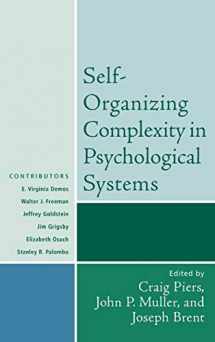
Self-Organizing Complexity in Psychological Systems (Volume 67) (Psychological Issues, 67)
ISBN-13:
9780765705259
ISBN-10:
0765705257
Edition:
1
Author:
Joseph Brent, John P. Muller, Craig Piers
Publication date:
2007
Publisher:
Jason Aronson, Inc.
Format:
Hardcover
192 pages
FREE US shipping
Book details
ISBN-13:
9780765705259
ISBN-10:
0765705257
Edition:
1
Author:
Joseph Brent, John P. Muller, Craig Piers
Publication date:
2007
Publisher:
Jason Aronson, Inc.
Format:
Hardcover
192 pages
Summary
Self-Organizing Complexity in Psychological Systems (Volume 67) (Psychological Issues, 67) (ISBN-13: 9780765705259 and ISBN-10: 0765705257), written by authors
Joseph Brent, John P. Muller, Craig Piers, was published by Jason Aronson, Inc. in 2007.
With an overall rating of 4.3 stars, it's a notable title among other
books. You can easily purchase or rent Self-Organizing Complexity in Psychological Systems (Volume 67) (Psychological Issues, 67) (Hardcover) from BooksRun,
along with many other new and used
books
and textbooks.
And, if you're looking to sell your copy, our current buyback offer is $0.4.
Description
This volume addresses itself to the ways in which the so-called 'new sciences of complexity' can deepen and broaden neurobiological and psychological theories of mind. Complexity theory has gained increasing attention over the past 20 years across diverse areas of inquiry, including mathematics, physics, economics, biology, and the social sciences. Complexity theory concerns itself with how nonlinear dynamical systems evolve and change over time and draws on research arising from chaos theory, self-organization, artificial intelligence and cellular automata, to name a few. This emerging discipline shows many points of convergence with psychological theory and practice, emphasizing that history is irreversible and discontinuous, that small early interventions can have large and unexpected later effects, that each life trajectory is unique yet patterned, that measurement error is not random and cannot be justifiably distributed equally across experimental conditions, that a system's collective and coordinated organization is emergent and often arises from simple components in interaction, and that change is more likely to emerge under conditions of optimal turbulence.


We would LOVE it if you could help us and other readers by reviewing the book
Book review

Congratulations! We have received your book review.
{user}
{createdAt}
by {truncated_author}


